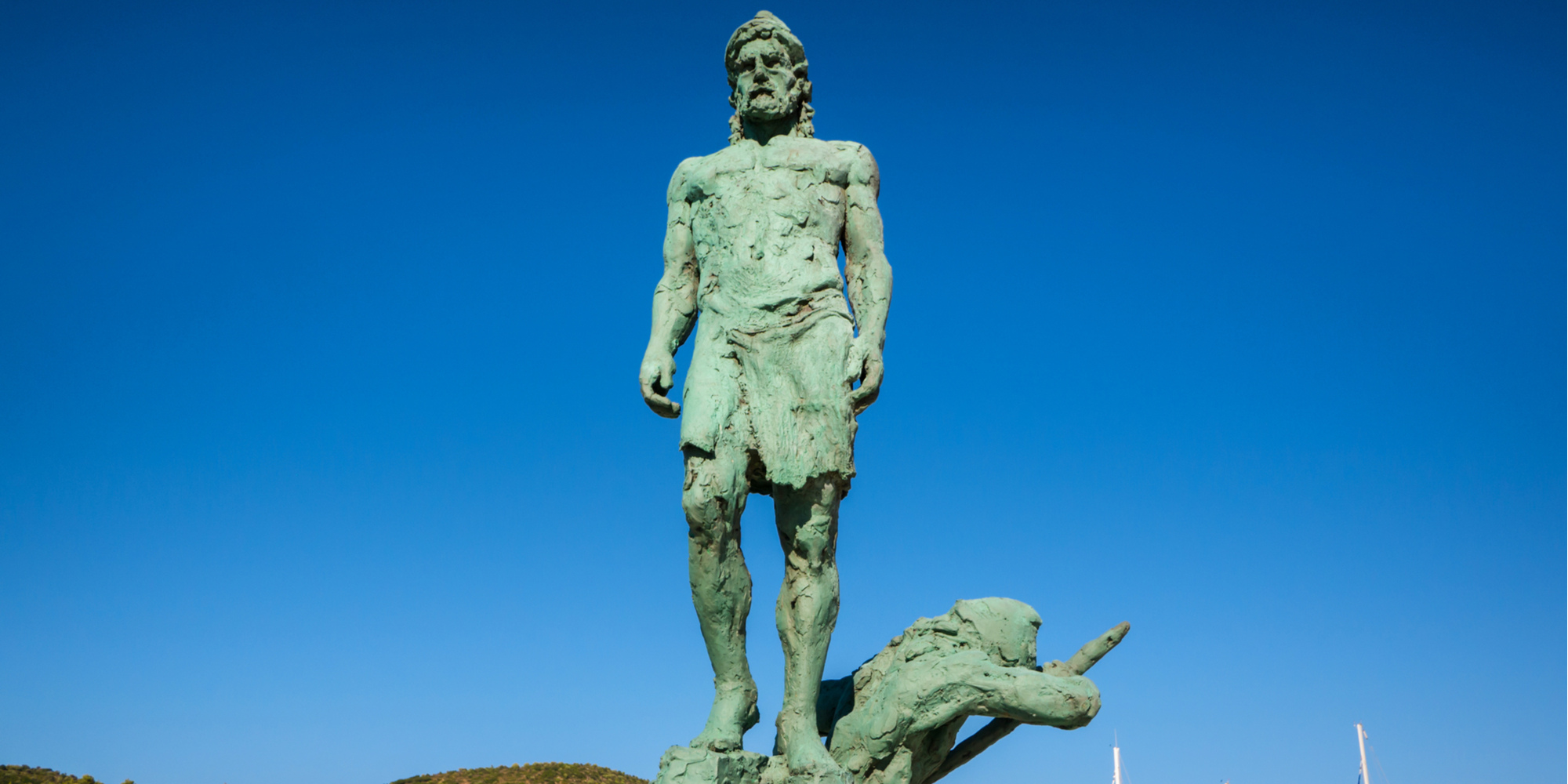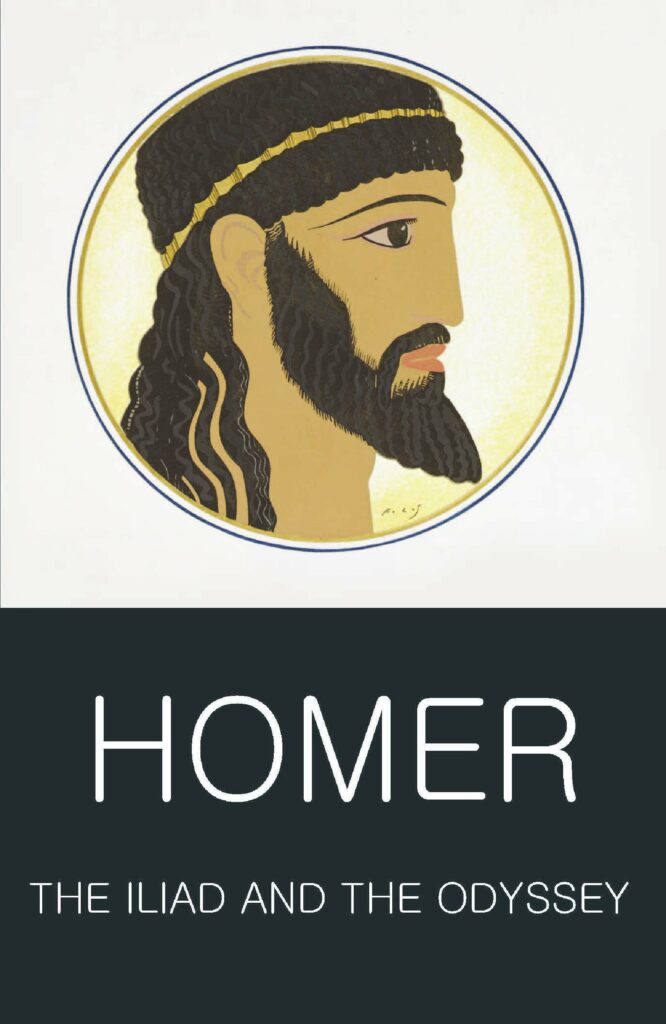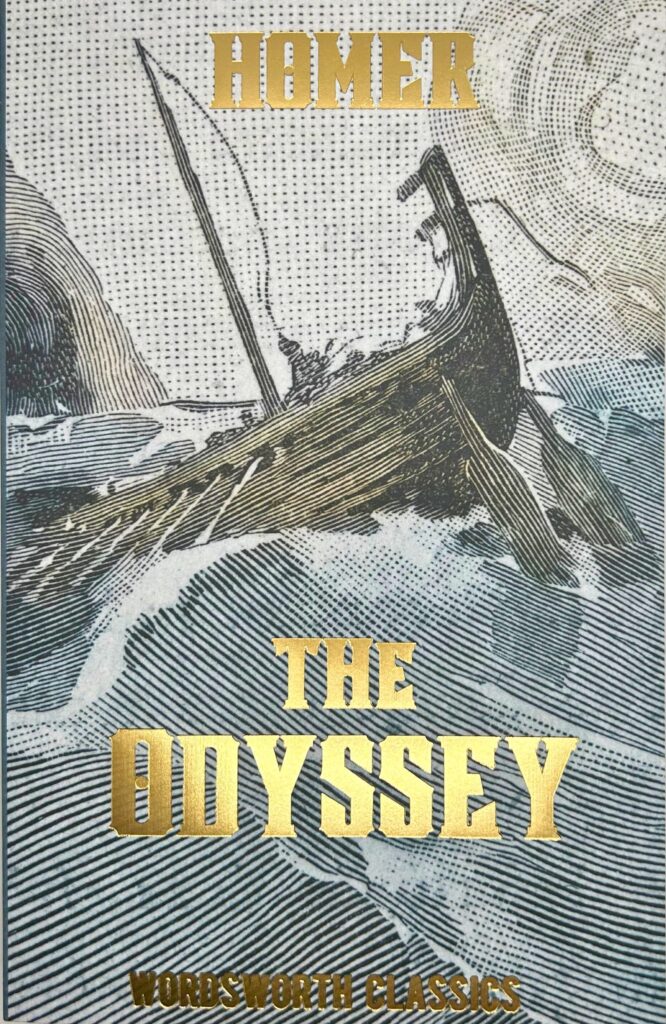
Mia Forbes looks at The Odyssey
Time in the Odyssey – Mia Forbes looks at the second epic ancient Greek poem attributed to Homer
ὥρη μὲν πολέων μύθων, ὥρη δὲ καὶ ὕπνου
There is a time for many stories, and a time for sleep too
(Od. 11.379)
In common parlance, ‘odyssey’ is generally used to describe an arduous journey undertaken by a weathered hero, striving against the odds to overcome a series of challenges and conflicts. With its famous episodes of the Lotus-Eaters, Cyclops and Sirens, it is no surprise that Homer’s Odyssey has lent its name to this genre of an adventure story. And yet, in reducing the epic to such a sequence of swashbuckling encounters, we risk occluding many of the finer motifs and messages presented by the poet over the course of its 24 books. The themes of family, glory, time and truth all have a part to play in making the poem an enduring exploration of human nature and society. They are indeed woven into the stories of fantastical monsters and exotic encounters, but many of Odysseus’ most memorable adventures actually fall outside the parameters of the narrative itself. From the start of the epic to its end, we witness the events of 40 days (17 of these are covered in a single couplet!) and the last half of the poem is dedicated to less than a week’s worth of action. During this time, nobody gets eaten by a giant or visits the land of the dead; such stories are contained in Books 9-12, in which Odysseus himself tells the Phaeacian king of his tormented travels from Troy, in the hope of receiving an embassy that will finally take him home to Ithaca. Taking up less than 20% of the poem’s verses, his tale spans a disproportionate chronological period of eight years, leaving us with a slightly skewed perspective of time in the Odyssey. The poet exploits and plays with this concept so that we too experience the passing and halting of time with the same eagerness, frustration and suspense as the characters.
The poem begins on Ithaca, while the hero is away from his homeland, still making his way back from the Trojan war, unbeknownst to his wife and son who can but pray for his eventual return. They are steadily losing hope, however, since it is now approaching the twentieth year of his absence, and his household has been overrun by 108 audacious young men who consume his stores, woo Penelope and abuse Telemachus, on the cusp on manhood but nonetheless unable to assert any sort of dominance over this large group of adversaries. Replicating their long separation from Odysseus, the poet withholds our first encounter with the hero until the start of Book 5, where he is introduced sitting on the rocks of the nymph Calypso’s island, weeping and wistfully longing for home.
In the meantime, the first four books (known as the ‘Telemachy’) instead focus on his son’s quest to discover the fate of his father, journeying to seek news from Nestor and Menelaus, other Iliadic heroes and his father’s comrades. His narrative echoes the travels of Odysseus himself, although on a far more modest and realistic scale, as both father and son experience foreign, unfamiliar societies which invite us to consider where Ithaca sits (or will sit) by contrast. Will it boast the exotic luxury and splendour of Sparta, mirror the piety seen by Telemachus at Pylos, replicate the idyllic monarchy of Scheria, or fall into the same savage rusticism of the Cyclopes? They each learn much from their adventures, and both return to Ithaca wiser and more cunning than they left it. Aside from the parallels it creates between father and son, the ‘Telemachy’ has another important function: it reminds us that time is slipping by, adding a sense of urgency to Odysseus’ homecoming (νοστος). With the suitors growing ever more impatient and Telemachus verging on manhood, the situation at Ithaca has become untenable; left much longer, Odysseus’ household is bound to collapse under their pressure. The hero must return, and soon.
Timing, then, is crucial to the epic’s story-line, and the most threatening challenges Odysseus’ faces are often posed by those who try to delay his νοστος. When his men consume the lotus plant, for example, they lose all desire for a speedy return. Likewise, the Sirens entice the hearer to remain forever in the crystallised, stagnant and ultimately illusory world of Iliadic glory which they conjure up with their song. Even the hospitable Phaeacians wish Odysseus to stay with them indefinitely. Time seems to lose its meaning in the magical, unchartable realm in which the hero’s adventures take place. Feasting is an apparently endless affair on the islands of Scheria and Aeolia, and on Ogygia, Aiaia and in the land of the Cyclopes, luxuriant wildlife and harvests seem to abound regularly by nature, without human tendance. As part of this mystical new world, Odysseus and his crew undergo strange rites of rejuvenation, transforming into younger and more handsome versions of themselves. Side-by-side with these supernatural occurrences, the unforgivingly realistic narrative of the ‘Telemachy’ reminds us that back home, time is slipping by. With her famous ploy, weaving by day and unpicking by night, Penelope attempts to allay the advances of her suitors and effectively to freeze the passing time. Although this works for three years, the scheme is brought to an inevitable end when a treacherous maid informs her, proving that in the real world, to which Odysseus must return, the clock cannot simply be turned back or stopped.
For the protagonist of the Odyssey, who, unlike his Iliadic counterpart, is completely aware of his mortality and even turns down Calypso’s offer of deification, there is no goal more important than his νοστος. He is not a hero who seeks immortality, but a man who wants to return to his family, household and position. The risk that he might meet his death before achieving this looms behind every shipwreck, every seductress and every monster he encounters. Such obstacles, however, are largely confined to the first half of the poem; in the final twelve books, the challenge he faces is far less fantastical but in some ways seems more insurmountable. Heroes can be expected to slay beasts and survive storms at sea, but as shown by Agamemnon’s inglorious death at the hands of the usurper Aegisthus and his band of supporters, even the fiercest warrior faces a futile fight when he is vastly outnumbered and underprepared. Odysseus’ solution is to return in disguise, concealing his true identity from Penelope, but enlisting the help of his son, a few loyal slaves and crucially the goddess Athena, who has stood by his side – or so she tells him – throughout his toils.
And so, upon his return to Ithaca, we see the king re-entering his palace dressed as a beggar, falling victim to the vituperations of the suitors. Throughout Odysseus’ suffering of their physical and verbal abuses, just as throughout his toils at sea, we are aware that he will make it, since gods, spirits and prophets alike foretell his eventual success. Tension in the Odyssey is not generated from the question of whether or not its protagonist will win the day; we know that our hero will be neither eaten by the Cyclops nor seduced by the Sirens. Likewise, we are sure that the fierce goddess Athena would never let her protege be defeated by some obscure suitor, and in any case, we have been told that it is his fate to meet an easy death far from the sea in his old age. Rather, instead of asking ‘if’, we are constantly asking ‘when?’, to which the poet’s inevitable reply is ‘not quite yet’. He teases us with a sequence of recognition scenes while conspicuously delaying the one reunion we most eagerly await. Even with the long-wandering Odysseus returns to the house, Penelope is kept in the dark. As a result, she is still tortured by the internal struggle she has been battling with in his absence, as she weighs up the costs of her persistent loyalty against those of a reluctant remarriage.
The suspense is pushed to its peak when husband and wife engage in an intimate conversation, but with Odysseus all the while maintaining his disguise. Although some scholars have argued that Penelope does in fact recognise him, her continued agonising over the fate of her apparently absent husband strongly suggests that this ignorance is genuine, a key part of the rich psychological portrait painted by the poet. Assuming that Odysseus is dead after two decades of separation, Penelope finally accepts defeat and sets up an archery contest to determine which of the suitors will win her hand. Only at this point, and even now with Penelope safely upstairs in her chambers, does the hero reveal his true identity. Having gained the upper hand, removing all other weapons from the great hall and winning the shooting contest, Odysseus allows the amassed suitors to see who they have really been abusing, and with the help of his son and slaves, proceeds to slaughter them all. After reuniting with his aged father and dealing swiftly with the political repercussions of the massacre, Odysseus secures his rightful position as king of Ithaca and head of his household with the aid of Athena, and it is on this note that the poet draws the epic to an end.
The heroic values of the Iliad, in which glory is won largely on the battlefield, are transformed in the Odyssey, where the hero succeeds not through physical force alone, but by combining it with cunning, deception and perfect timing. Whereas at Troy the warrior boldly declares his name and purpose before charging into battle, in the unmappable world of his travels Odysseus learns the value of anonymity, reticence and delay. Trapping Odysseus’ crew in his cave, the Cyclops promises their captain that he will be eaten last of all, a ‘gift’ well-matched to his standards of hospitality. By coming last, the hero manages to win first place, just one example out of a series of reversals that secure him his success: back home on Ithaca his disguise as a weak and feeble beggar enables him to reclaim his rightful position as king and conqueror. And yet, throughout the long sequence of transformations performed by Odysseus (he plays both prince and pauper, warrior and trickster, father and son, husband and lover, host and guest, hero and vagrant) the poet characterises his protagonist with several unchanging qualities, the most notable being his ability to endure. One of his epithets is ‘much-enduring’ (πολυτλας) which, alongside πολυμητις (‘of many wiles’) and πολυστονος (‘of much sorrow’), captures the dichotomy embodied by the hero. The πολυ- prefix attests to his multiplicity, as the versatile hero contains within himself the ability to adopt a variety of personas. The second half of the epithet highlights the endurance that enables him to persist through all the toils he faces and keep a hold of his identity and goals, even while his outward appearance shifts. This ability to bear both the perils at sea and the abuse (and missiles!) hurled at him by less worthy men, is what sets Odysseus apart from the other heroes of the Homeric epics. Instead of constant recourse to violence, he learns to conserve his strength, take stock of the situation and strike from a position of power, proving that, while immediate action and brute force may have worked on the battlefield at Troy, in the real world where categories of friend and foe, war and peace, strength and power are often not so clear cut, timing truly is everything.
Blog image: The statue of Odysseus made from bronze at the port of Ithaca island. smoxx / Shutterstock.com

